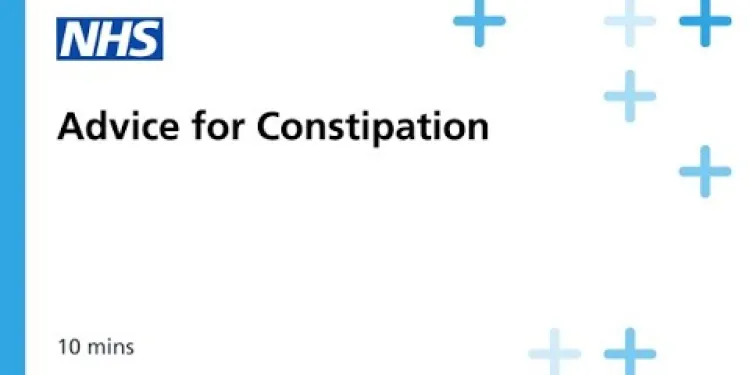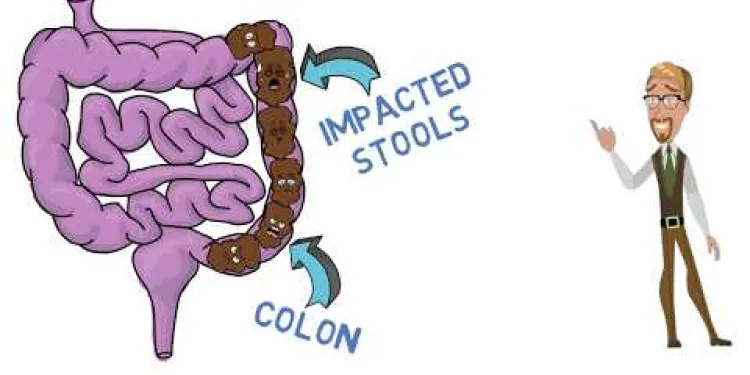Find Help
More Items From Ergsy search
-

NHSGGC - Reviewing Laxatives
Relevance: 100%
-

How to treat constipation | NHS
Relevance: 34%
-

Constipation: Tips for those suffering with constipation
Relevance: 28%
-

The effective treatment of childhood constipation according to NICE guidelines.
Relevance: 20%
-

What is irritable bowel syndrome (IBS)?
Relevance: 18%
-

What is irritable bowel syndrome (IBS)?
Relevance: 17%
-

Anorexia nervosa | NHS
Relevance: 17%
-

What happens during a colonoscopy?
Relevance: 17%
-

Treating irritable bowel syndrome (IBS)
Relevance: 17%
-

About irritable bowel syndrome (IBS)
Relevance: 16%
-

Treating irritable bowel syndrome (IBS)
Relevance: 16%
-

What happens during a colonoscopy? | NHS
Relevance: 16%
-

Can fake weight loss drugs come in unusual forms?
Relevance: 16%
-

Endoscopy Unit
Relevance: 13%
-

What to expect at your colonoscopy
Relevance: 12%
-

Your Visit to the Endoscopy Unit at NHS Tayside
Relevance: 12%
-

Endoscopy Procedures | Colonoscopy
Relevance: 11%
-

What is a CT colonography?
Relevance: 11%
-

Endoscopy Introduction - The Patient Journey
Relevance: 11%
-

How soon should you see a doctor if you suspect appendicitis?
Relevance: 6%
-

Sandwell and West Birmingham Hospitals NHS Trust – Faecal Incontinence and Constipation Healthcare
Relevance: 6%
-

Anorexia nervosa | NHS
Relevance: 5%
-

About irritable bowel syndrome (IBS)
Relevance: 5%
-

IBS and your mind: Is there a connection?
Relevance: 5%
-

IBS and your mind: Is there a connection?
Relevance: 5%
-

Coming to the Endoscopy Unit at Harrogate District Hospital
Relevance: 5%
-

Symptoms of irritable bowel syndrome (IBS)
Relevance: 5%
-

Symptoms of irritable bowel syndrome (IBS)
Relevance: 5%
-

Diagnosing irritable bowel syndrome (IBS)
Relevance: 5%
-

Causes of irritable bowel syndrome (IBS)
Relevance: 5%
-

What are the recommendations for colorectal cancer screening?
Relevance: 5%
-

What are the advantages of an at-home colorectal cancer test?
Relevance: 5%
NHSGGC - Reviewing Laxatives
Introduction to NHSGGC
NHS Greater Glasgow and Clyde (NHSGGC) is the largest health board in the United Kingdom, providing comprehensive healthcare services to a population of over 1.2 million people. The organisation is dedicated to ensuring that all patients receive high-quality, evidence-based care. One of the important areas that NHSGGC monitors and reviews routinely is the use of laxatives in clinical practice.Understanding Laxatives
Laxatives are substances used to promote bowel movements and are commonly prescribed or recommended for people suffering from constipation. There are several types of laxatives, including bulk-forming agents, stool softeners, osmotic laxatives, and stimulant laxatives. Each type works differently and is suited to different situations and patient needs.Criteria for Reviewing Laxatives
Reviewing laxatives involves an in-depth look into their efficacy, safety, and the appropriateness of their use. NHSGGC follows strict guidelines to ensure that laxatives are prescribed only when necessary and that patients are educated on how to use them correctly. Key criteria include the latest clinical evidence, patient feedback, and adverse event reports.Importance of Proper Use
Proper use of laxatives is crucial to avoid potential complications such as dependency, electrolyte imbalances, and bowel damage. NHSGGC emphasizes the importance of following medical guidance and not using laxatives for extended periods unless advised by a healthcare professional. Lifestyle modifications like increased fibre intake, hydration, and exercise are often recommended as first-line treatments for constipation.Ongoing Monitoring and Feedback
NHSGGC has systems in place for ongoing monitoring of laxative use, including patient feedback and regular clinical reviews. This ensures that any issues are promptly identified and addressed. The organisation also promotes educational programs for both healthcare professionals and patients to foster safe and effective use of laxatives.Conclusion
NHSGGC's commitment to reviewing laxatives is part of its broader aim to provide safe and effective healthcare. By continuously evaluating the use of laxatives and educating both healthcare providers and patients, NHSGGC strives to improve outcomes for those suffering from constipation while minimising potential risks.NHSGGC - Checking How We Use Laxatives
About NHSGGC
NHS Greater Glasgow and Clyde (called NHSGGC) is a big health organisation in the United Kingdom. It helps more than 1.2 million people. NHSGGC works hard to give everyone the best care. One thing NHSGGC looks at closely is how we use laxatives.What Are Laxatives?
Laxatives help people go to the toilet. They are often used when someone has constipation. There are different types of laxatives like bulk-formers, stool softeners, osmotic, and stimulant laxatives. Each type works in a different way to help with constipation.How NHSGGC Checks Laxatives
NHSGGC checks how well laxatives work and if they are safe. They make sure people use them properly. NHSGGC uses rules to decide if laxatives should be given. They look at new information, what patients say, and if there are any problems with using them.Using Laxatives Correctly
It is important to use laxatives the right way. If not, they can cause problems like needing to use them all the time, or hurting your stomach. NHSGGC says to always follow your doctor's advice. Try to eat more fiber, drink water, and exercise to help with constipation.Watching and Listening
NHSGGC keeps an eye on how laxatives are used. They listen to patients and check regularly to fix any issues. NHSGGC also teaches doctors and patients how to use laxatives safely.Final Thoughts
NHSGGC wants to make sure laxatives are used safely and correctly. They continue to check how laxatives are used and help educate everyone about them. This way, they can help people with constipation while keeping them safe.Frequently Asked Questions
What are laxatives?
Laxatives are medications that help stimulate bowel movements to relieve constipation.
Are there different types of laxatives?
Yes, there are several types including bulk-forming, osmotic, stimulant, and stool softeners.
When should I use a laxative?
Laxatives should generally be used if dietary changes and other lifestyle adjustments have not been effective in relieving constipation.
Can laxatives cause side effects?
Yes, potential side effects can include abdominal cramps, bloating, diarrhoea, and dehydration.
Is it safe to use laxatives long-term?
Long-term use of laxatives is not generally recommended, as it can lead to dependency and other health issues. Always consult your GP for advice on prolonged use.
What are bulk-forming laxatives?
Bulk-forming laxatives absorb water into the bowel, which makes stools softer and easier to pass. They include products like psyllium and methylcellulose.
What are osmotic laxatives?
Osmotic laxatives draw water into the bowel from nearby body tissues, which softens stools and stimulates bowel movements. Examples include lactulose and polyethylene glycol.
What are stimulant laxatives?
Stimulant laxatives increase bowel muscle contractions to help move stools along. Examples include senna and bisacodyl.
What are stool softeners?
Stool softeners make stools easier to pass by adding moisture. An example is docusate sodium.
Are there any natural alternatives to laxatives?
Yes, increasing fibre intake, drinking plenty of fluids, and exercising regularly can help to relieve constipation naturally.
Can children use laxatives?
Laxatives can be used for children, but it's important to consult a healthcare professional for appropriate dosage and type.
Can pregnant women use laxatives?
Some laxatives are safe for use during pregnancy, but it's important for pregnant women to consult their GP before using any laxative.
Do I need a prescription to get laxatives?
Many laxatives are available over-the-counter, but some stronger types may require a prescription from a healthcare provider.
What should I do if I accidentally take too much laxative?
If you overdose on laxatives, seek immediate medical attention. Symptoms of overdose can include severe diarrhoea, dehydration, and abdominal pain.
Can dietary changes help with constipation?
Yes, increasing fibre intake through fruits, vegetables, and whole grains, along with proper hydration, can significantly help alleviate constipation.
What are laxatives?
Laxatives are medicines or foods that help you go to the toilet if you are having trouble. They make it easier to poo. Ask a doctor or a parent if you need help.
Helpful tools: Use pictures or videos to learn more. Ask an adult if you have questions.
Laxatives are medicines that help you go to the toilet and poop when you're having trouble.
Are there different kinds of medicine to help you poo?
Yes, there are different kinds of medicines to help you poo. These are:
- Bulk-forming: They make your poo bigger and softer.
- Osmotic: They add water to your poo to make it soft.
- Stimulant: They help your tummy muscles push poo out.
- Stool softeners: They make your poo smooth and easy to pass.
You can use tools like picture charts or talk to a helper to remember these types.
When is it okay to use medicine for going poo?
Only use laxatives if changing what you eat and making other life changes have not helped you poop.
Can taking laxatives make you feel unwell?
Yes, some things that might happen are belly aches, feeling puffy, loose poo, and not having enough water in your body.
Are laxatives safe to use for a long time?
No, it is not safe to use laxatives for a long time.
Laxatives are only for short-term use.
Using them too much can harm your body.
If you have trouble going to the toilet, talk to a doctor.
You can also try eating more fruit and vegetables. Drinking water can help too.
Using laxatives for a long time is not usually a good idea. It can make your body rely on them and cause other health problems. Always talk to your doctor if you need to use them for a long time.
What are bulk-forming laxatives?
Bulk-forming laxatives are medicines that help you poo more easily.
They make your poo softer and bigger, so it is easier to pass.
These can help if you are having trouble pooing.
To use them, drink lots of water and eat foods with fiber, like fruits and vegetables.
Bulk-forming laxatives help make going to the toilet easier. They soak up water in your tummy, making poo softer and easier to pass. Some types are psyllium and methylcellulose.
What are osmotic laxatives?
Osmotic laxatives are a type of medicine. They help you go to the toilet. They make it easier to poo. They work by bringing water into your poo. This makes the poo softer and easier to pass.
If you have trouble reading or understanding, you can ask someone to help you. You can also use tools like audiobooks or reading apps to hear the information.
Osmotic laxatives help you go to the toilet by bringing water into the bowel. This makes poo softer and easier to pass. Some examples are lactulose and polyethylene glycol.
What are stimulant laxatives?
Stimulant laxatives are medicine that help you poo. They make your tummy muscles work harder so that your poo moves through your body.
Helpful Tips:
- Drink lots of water.
- Eat fruits and vegetables.
- Ask a grown-up if you need help.
Stimulant laxatives help your body go to the toilet by making your tummy muscles move. Two types of stimulant laxatives are senna and bisacodyl.
What are stool softeners?
Stool softeners are medicine to help you poo. They make your poo softer so it's easier to go to the toilet.
If you find it hard or it hurts to poo, stool softeners might help. They make pooing more comfortable.
Ask a grown-up, a doctor, or a nurse if you need help with stool softeners. They can tell you if it is right for you.
Tools that can help: Pictures, videos, and talking to someone you trust can help you understand better.
Stool softeners help make it easier to poop. They work by adding water to the poop, so it is not hard. Docusate sodium is one kind of stool softener.
Are there natural ways to help you poop?
Do you want to know if there are things from nature that can help you go to the toilet? Let's find out!
Here are some things that might help:
- Eat more fruits, like apples and pears.
- Try eating vegetables, such as carrots or broccoli.
- Drink plenty of water every day.
- Go for a walk or do some light exercise.
- Sit on the toilet at the same time each day to get your body used to it.
If you are still having trouble, you can talk to a grown-up or a doctor. They can help you find more ways to feel better.
Yes, eating more fiber, drinking lots of water, and doing exercise can help you poop better.
Can kids use laxatives?
Laxatives are medicines that help you go to the toilet. They make it easier to do a poo.
Kids should ask a doctor or a grown-up before using laxatives. Laxatives are not for kids unless a doctor says it's okay.
If a kid is having trouble doing a poo, it helps to:
- Drink lots of water.
- Eat foods with fiber, like fruits and vegetables.
- Talk to a grown-up for advice.
Remember, always ask for help if you're not sure.
You can use medicines to help kids if they have trouble going to the bathroom. But you should always talk to a doctor or nurse first to find out how much and what kind they should take.
Can pregnant women take medicine to help them poop?
Pregnant women might have trouble going to the bathroom. It's important to be careful with medicines.
Here is what you can do:
- Talk to your doctor before taking any medicine.
- Eat more fruits, veggies, and whole grains to help you poop.
- Drink lots of water every day.
- Go for gentle walks to help your tummy.
These tips can help you feel better.
Some medicines that help you poo are safe when you are pregnant. But it is very important to talk to your doctor before using any of these medicines.
Do I need a doctor to give me laxatives?
You can buy many laxatives from the store. Some stronger ones need a doctor's note.
What to Do if You Take Too Much Laxative
If you take too much laxative, don't worry. Here is what you can do:
- Tell an adult you trust. They can help you.
- Drink plenty of water. It helps keep you safe.
- Rest in a comfortable place.
- If you have a tummy ache or feel sick, tell someone.
- If you are very worried, get help from a doctor.
Tools that can help:
- A drink bottle to sip water.
- A comfy blanket to help you rest.
If you take too many laxatives, get help from a doctor right away. Taking too many can make you very sick. You might have bad diarrhoea, lose too much water from your body, and have a tummy ache.
Can eating different foods help if you can't poo?
If you have trouble going to the toilet, changing what you eat might help.
- Try eating more fruits and vegetables.
- Drink plenty of water.
- Whole grains like oats and brown bread are good too.
These steps can help make it easier to poo.
Eating more foods with fiber, like fruits, vegetables, and whole grains, can help if you have trouble going to the bathroom. Drinking lots of water is important too.
Useful Links
- Ergsy carfully checks the information in the videos we provide here.
- Videos shown by Youtube after a video has completed, have NOT been reviewed by ERGSY.
- To view, click the arrow in centre of video.
- Most of the videos you find here will have subtitles and/or closed captions available.
- You may need to turn these on, and choose your preferred language.
- Go to the video you'd like to watch.
- If closed captions (CC) are available, settings will be visible on the bottom right of the video player.
- To turn on Captions, click settings .
- To turn off Captions, click settings again.
More Items From Ergsy search
-

NHSGGC - Reviewing Laxatives
Relevance: 100%
-

How to treat constipation | NHS
Relevance: 34%
-

Constipation: Tips for those suffering with constipation
Relevance: 28%
-

The effective treatment of childhood constipation according to NICE guidelines.
Relevance: 20%
-

What is irritable bowel syndrome (IBS)?
Relevance: 18%
-

What is irritable bowel syndrome (IBS)?
Relevance: 17%
-

Anorexia nervosa | NHS
Relevance: 17%
-

What happens during a colonoscopy?
Relevance: 17%
-

Treating irritable bowel syndrome (IBS)
Relevance: 17%
-

About irritable bowel syndrome (IBS)
Relevance: 16%
-

Treating irritable bowel syndrome (IBS)
Relevance: 16%
-

What happens during a colonoscopy? | NHS
Relevance: 16%
-

Can fake weight loss drugs come in unusual forms?
Relevance: 16%
-

Endoscopy Unit
Relevance: 13%
-

What to expect at your colonoscopy
Relevance: 12%
-

Your Visit to the Endoscopy Unit at NHS Tayside
Relevance: 12%
-

Endoscopy Procedures | Colonoscopy
Relevance: 11%
-

What is a CT colonography?
Relevance: 11%
-

Endoscopy Introduction - The Patient Journey
Relevance: 11%
-

How soon should you see a doctor if you suspect appendicitis?
Relevance: 6%
-

Sandwell and West Birmingham Hospitals NHS Trust – Faecal Incontinence and Constipation Healthcare
Relevance: 6%
-

Anorexia nervosa | NHS
Relevance: 5%
-

About irritable bowel syndrome (IBS)
Relevance: 5%
-

IBS and your mind: Is there a connection?
Relevance: 5%
-

IBS and your mind: Is there a connection?
Relevance: 5%
-

Coming to the Endoscopy Unit at Harrogate District Hospital
Relevance: 5%
-

Symptoms of irritable bowel syndrome (IBS)
Relevance: 5%
-

Symptoms of irritable bowel syndrome (IBS)
Relevance: 5%
-

Diagnosing irritable bowel syndrome (IBS)
Relevance: 5%
-

Causes of irritable bowel syndrome (IBS)
Relevance: 5%
-

What are the recommendations for colorectal cancer screening?
Relevance: 5%
-

What are the advantages of an at-home colorectal cancer test?
Relevance: 5%


